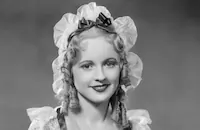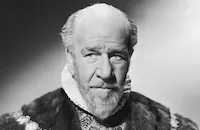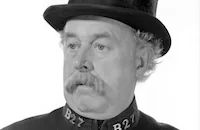Double Harness

Brief Synopsis
Cast & Crew
John Cromwell
Ann Harding
William Powell
Lucile Browne
Henry Stephenson
Lilian Bond
Film Details
Technical Specs

Synopsis
After her extravagant, irresponsible sister Valerie marries Dennis Moore, Joan Colby sets her sights on John Fletcher, a notorious San Francisco playboy. Joan's old-fashioned father, Colonel Sam Colby, complains that John, who inherited his father's shipping business, is so lazy that he is driving his company into bankruptcy. In spite of the colonel's disapproval, Joan pursues a romance with John and announces to Valerie that, while she does not love John, she intends to marry him. Joan explains to her sister that marriage is the business of women and that love is a complication to be avoided. Although John responds deeply to Joan, whom he regards as "virginal" yet alluring, she worries that he will soon return to his previous lover, Monica Page. While Joan woos the marriage-wary John, Monica begins to telephone him and makes known her desire to rekindle their affair. Consequently, Joan arranges with Valerie to have their father show up at John's apartment one night when she is alone with him. As hoped, the colonel is shocked and demands that John marry Joan immediately. Because Joan is willing, John agrees but, as he explains to Joan on their honeymoon cruise, intends to divorce her after they return to San Francisco and accepts Joan's suggestion that they end the marriage in six months. Two months later, John is already feeling anxious about his "captivity," but tells Joan he appreciates her efforts to make a legitimate businessman out of him. To that end, Joan has arranged with her father to have his friend, Oliver Lane, the postmaster general of the United States, meet John at a dinner party in the hope that Lane will grant the Fletcher shipping line a profitable government contract. At the same time, Valerie confides in Joan that she needs $1,000 to pay clothing debts but is afraid to ask for the money from Dennis, who has threatened to leave her because her extravagances have repeatedly landed her in debt. Although she refuses to ask John for the money, Joan does agree to pawn her mother's engagement ring to help her sister. When Joan is only able to raise $500 for the ring, Valerie secretly asks John for a loan, lying that she needs $1,000 to cover household expenses because of Dennis' failing business. Overhearing John giving Valerie a check, Joan denounces her sister and demands that she grow up and resolve her financial problems on her own. Furious, Valerie reveals Joan's marriage trick to John, and stricken by the truth, John leaves and goes to the waiting Monica. Joan follows him to Monica's and, after apologizing for her deception, confesses that she has truly fallen in love with him. Joan then returns home, where Lane and her other dinner party guests are waiting. To Joan's delight, Lane agrees to give the absent John his business. Then, just after a drunken but repentant Valerie prepares to tell her husband the truth about her spending, John returns to his devoted wife, bringing her a box of gardenias, her favorite flower, to signify his love.

Director

John Cromwell
Cast

Ann Harding

William Powell

Lucile Browne

Henry Stephenson
Lilian Bond

George Meeker

Reginald Owen
Kay Hammond
Leigh Allen
Hugh Huntley
Wallis Clark
Fredric Santley

Irving Bacon
Crew
James Almond
Merian C. Cooper
Doran Cox
James Daly
George D. Ellis
E. J. Harman
Kenny Holmes
J. Roy Hunt
Chick Kirk
Jim Kirley
Kenneth Macgowan
John Miehle
Jane Murfin
George Nicholls Jr.
Van Nest Polglase
Eddie Pyle
Tom Scott
Ollie Sigurdson
Max Steiner
James G. Stewart

Photo Collections
(Pressbook images courtesy of the Academy of Motion Picture Arts and Sciences)
Videos
Movie Clip


Trailer
Film Details
Technical Specs

Articles
Double Harness
William Powell, already a major star thanks in large part to his polished performances as Philo Vance in a series of popular detective films at Paramount, was a year away from his Thin Man triumph at MGM when Warner Bros., then his home studio, lent him to RKO for Double Harness. According to Powell biographer Charles Francisco, "The Hollywood trade press and movie insiders were agog that Warners would loan out a star of Powell's magnitude to a lesser studio such as RKO." Two years into his Warners contract, Powell was thought by some to be in danger of prematurely becoming a has-been.
Never one to fret unnecessarily about career matters, Powell moved confidently ahead, trusting his agent Myron Selznick (brother of David) to protect his interests at RKO. Powell liked the script for Double Harness and was pleased with the choice of Ann Harding, a New York actress whose abilities he had respected since her days as a stage actress in the 1920s, as his leading lady. The film turned out to be one of Harding's most attractive showcases, marking one of the few times when this aristocratic, accomplished actress was allowed to look glamorous and take on a saucy character - one formerly recommended for Irene Dunne.
Double Harness is based on a play by Edward Poor Montgomery, inspired in turn by a novel by Anthony Hope. The play, set in London but relocated to San Francisco in its film version, was described in a report to RKO as "a story that cuts across the grain of American morals and marriage concept. With delicate handling could be made into a rather brilliant picture, proving that love is the thing no matter how arrived at."
Harding plays Joan Colby, a lovely, warm-blooded young schemer who explains to her engaged sister (Lucile Browne) that "Marriage is a woman's business," and therefore emotions should be allowed to interfere. Accordingly, she sets her cap for wealthy playboy John Fletcher (Powell) and tricks him into marriage by contriving to have her father (Henry Stephenson) pop into John's apartment and find the couple in a compromising situation.
During the film's TCM restoration, it was discovered that for its television showings and some international screenings, two and one-half minutes had been taken out of the seduction scene. In the TV print, after promising to slip into "something cooler," Harding later reappears wearing the same dress. Now we see the uncensored version, with an interlude in which Joan is dressed in sexy pajamas for the "business" of seducing John. In pre-Code days, it was acceptable to acknowledge that she was not above granting pre-marital favors to get what she wants.
Joan's ploy works, but backfires when John catches on, becomes resentful and takes up with a pretty brunette (Lilian Bond). As a divorce looms, Joan sets out to win her husband's love honestly. She even helps him turn his business around and become profitable again. Matters are resolved with a screwball dinner scene in which the guests withdraw because of drunkenness or other emergencies, the cook and butler get into a fight, and the couple manages to iron out its differences.
Jean Malin, who had gained fame as a female impersonator in the 1920s and was part of the so-called "pansy craze" of the early 1930s, was originally cast as dress-shop owner Bruno in the opening scenes. He filmed the sequence and can still be seen in some publicity stills. But the scenes were reshot with Fredric Santley, at the then-sizeable cost of $1,669, after RKO executives ruled that Malin was too flamboyant a presence even for those liberal times. Studio president B.B. Kahane wrote in an inter-studio memo that "I do not think we ought to have this man on the lot on any picture -- shorts or features."
Powell and Harding, in their only teaming, share a strong chemistry. Double Harness justified Powell's faith by becoming a critical and financial success, with one reviewer commenting that "This delightful marital drama is intelligent stuff." Another wrote, "It has long been a source of wonderment to me as to why these two fine stage veterans, Ann Harding and William Powell, have not blended their seasoned talent and sparklingly individualistic personalities long before this." Seen today, the movie seems at once modern and nostalgic, offering a vivid reflection of a sophisticated era in filmmaking.
Double Harness is sleekly directed by John Cromwell (1887-1979), who encountered censorship problems with two of his other RKO films of the pre-Code period, Ann Vickers (1933) and Of Human Bondage (1934). Among his other directorial credits is Since You Went Away, nominated for an Oscar® as Best Picture of 1944. Considered a gifted and proficient "studio director," Cromwell also had numerous credits as an actor on Broadway and, later, in the films of Robert Altman. He was blacklisted in Hollywood as a Communist from 1951 to 1958.
The director's adopted son, James Cromwell, was an Oscar® nominee for his performance in Babe (1995) and has recently been seen as Prince Philip in The Queen (2006) and as the sinister father in TV's 24. The younger Cromwell introduced Double Harness when it was screened in its restored version at Film Forum in New York City in February 2007. "I've not only never seen it, but I never knew it existed," he told The New York Post. "I recognize a lot of bits of business from my dad that he's given to the actors."
Producer: Merian C. Cooper (Executive Producer), Kenneth Macgowan (Associate)
Director: John Cromwell
Screenplay: Jane Murfin from play by Edward Poor Montgomery and novel by Anthony Hope
Cinematography: J. Roy Hunt
Film Editing: George Nichols, Jr.
Art Direction: Van Nest Polglase, Chick Kirk
Costume Design: Walter Plunkett (uncredited)
Cast: Ann Harding (Joan Colby), William Powell (John Fletcher), Lucile Browne (Valerie Colby), Henry Stephenson (Col. Sam Colby), Lilian Bond (Monica Paige), George Meeker (Dennis Moore), Reginald Owen (Freeman), Kay Hammond (Eleanor Weston).
BW-69m. Closed captioning.
by Roger Fristoe

Double Harness
Quotes
Trivia
Notes
[Editor's note: Double Harness was not viewed prior to the publication of its entry in the AFI Catalog of Feature Films, 1931-40. This entry was revised after a 2007 viewing of the film.] Hollywood Reporter news items list Betty Furness as a cast member, but she was not identifiable in the print viewed. An Hollywood Reporter news item announced that director John Cromwell would also produce the film, but only Merian C. Cooper and Kenneth Macgowan are credited onscreen.
As recounted in a Los Angeles Times article in April 2007, Double Harness was one of six films that were being broadcast on the Turner Classic Movies (TCM) cable station after having not been publicly screened for decades. The other five films included Rafter Romance (1933), One Man's Journey (1933), Stingaree (1934), Living on Love (1937), and A Man to Remember (1938, see entries below). The Los Angeles Times article and on-air commentaries before the broadcasts of each film related that the rights to the pictures had been in legal limbo since the early 1930s when executive producer Cooper left RKO and received the rights to six of the studio's films. Later, Cooper and a business associate, Ernest L. Scanlon, became embroiled in a dispute that left the films' status ambiguous.
The Los Angeles Times article continued that, in April 2006, following an inquiry from a curious fan, TCM investigated and eventually learned that 35mm copies of five prints used for television distribution in the 1950s were held within the Merian C. Cooper Collection at the motion picture archives at Brigham Young University. The films were subsequently restored and, with the addition of a Dutch copy of the sixth film, A Man to Remember (see below), the package was shown on TCM in April 2007. For Double Harness, an additional two-and-half minute sequence that had been cut from the print made for television distribution, was located in a French negative discovered in the National Center for Cinematography in France. The brief segment had been cut because it indicated that the characters of "Joan Colby" and "John Fletcher" were having pre-marital sex.















